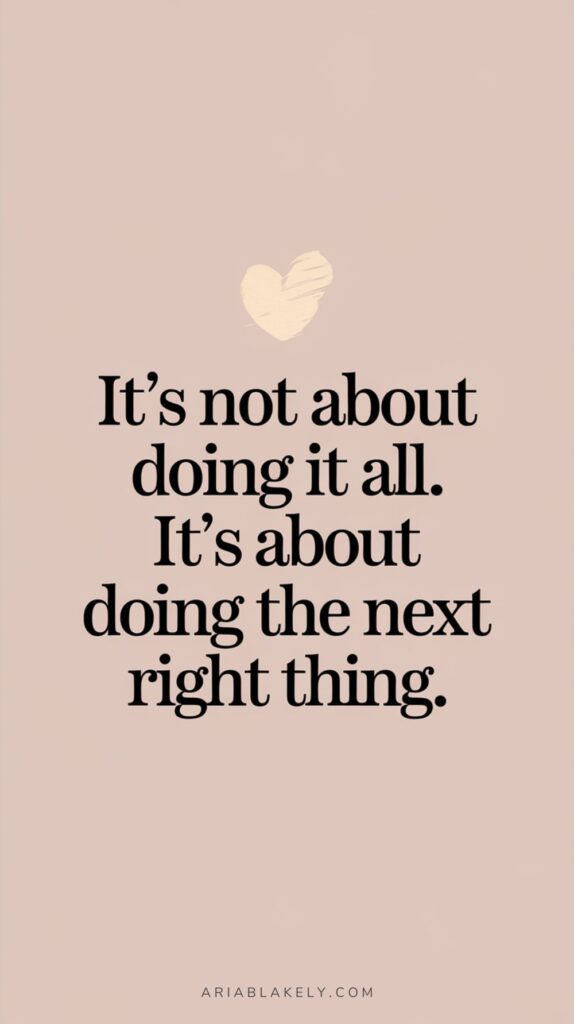Let me be real with you—I used to think starting small meant I was playing small.
As a nurse, a mom, and a woman who’s constantly juggling schedules, emotions, and snack requests, I spent years believing that if I didn’t go all-in, all-out, all-at-once… I was failing. (Spoiler: I wasn’t.)
The truth? Starting small is one of the smartest, most powerful things you can do for yourself.
Because when you’re chasing a big dream—whether it’s starting a business, getting healthier, decluttering your home, or just showing up for yourself in a new way—it’s NOT the overnight leaps that get you there.
It’s the tiny, sometimes invisible steps you take every day when no one’s clapping for you yet.
So if you’ve been waiting to feel “READY” or feel like you have to do it all at once—take a breath.
This article is your permission slip to start smaller, slower, and smarter.
Here are 15 reasons why starting small isn’t weakness—it’s your secret weapon.
Starting Small Builds a Strong Foundation

1. It Gives You Clarity
When everything feels BIG—your goals, your to-do list, your expectations—it’s easy to spiral into decision fatigue or analysis paralysis (been there, probably last Tuesday).
Starting small helps you clear through the mental clutter.
Instead of trying to “fix your whole life,” you FOCUS on one drawer, one walk, one conversation.
And something amazing happens: you start seeing what actually matters.
You figure out where your energy goes, what drains you, and what lights you up.
Clarity doesn’t come from thinking harder. It comes from moving—one small step at a time.
“I’ll just do this one thing today” turns into “I finally know what I want.”
You might also like: 50 Effortless Ways To Get Your Life Together
2. It Helps You Prioritize What Matters
When I first decided to get serious about self-care (real self-care—not the Instagram version), I thought I had to do yoga, meal prep, journal, and drink lemon water before 7am.
Girl, no.
Starting small taught me this: YOU don’t have to do everything. You just have to do what counts.
That’s the magic of starting small.
It forces you to zoom in on the few things that actually move you forward.
You stop chasing the perfect morning routine and start asking: What do I need most today?
It’s not about doing more—it’s about doing what matters most, first.
You might also like: 160 Short Positive Daily Affirmations
3. It Reduces Risk (and Saves Money, Time, and Sanity)
Let’s be honest: jumping headfirst into something brand new without a plan can be expensive—emotionally, financially, and otherwise.
That’s WHY I always test new routines, habits, or even blog ideas in micro form.
Instead of overhauling your entire kitchen with the latest wellness trend, you try one healthy recipe this week.
Instead of buying all the organizing bins from The Container Store, you declutter one cabinet with what you’ve got.
📌 Starting small = less risk + more wisdom.
It gives you time to learn what works, adjust what doesn’t, and avoid the chaos of doing too much too fast.
Starting Small Helps You Learn Faster

4. You Can Test Ideas Without Burning Out
Here’s a truth I learned the hard way: not every great idea needs a grand launch.
Sometimes you need to just try it quietly—see how it feels in real life, not just in your head.
That’s what starting small lets YOU do. You’re not committing to forever. You’re just experimenting.
Want to try a new hobby? Don’t buy all the gear—start with a 10-minute YouTube video.
Thinking about a side hustle? Offer your service to one friend before building the website.
📌 You’re not avoiding action. You’re choosing smart action.
There’s actually a name for this approach: small-scale testing, and it’s used in everything from startups to education because it lets you fail fast and learn faster.
Harvard Business Review calls this the “build-measure-learn” cycle.
I call it: being kind to your future self.
5. You Learn As You Go (Without Needing It to Be Perfect)
Raise your hand if you’ve ever NOT started something because you “needed to research more first.” (Yep. Same.)
But here’s what I’ve learned after years of parenting, nursing, and blogging: you learn best when you’re in motion.
That first step teaches you more than 10 hours of Googling ever could.
And when you keep those steps small, you make space for feedback, reflection, and course-correction WITHOUT the burnout.
You’re not behind. You’re just learning. One step, one lesson, one brave moment at a time.
6. You Stay Flexible (Which Is Everything)
Life never sticks to the plan. Your kids will get sick, your job will throw curveballs, your energy will shift—and that’s okay.
Starting small helps you stay nimble instead of stuck.
Small steps are easy to pivot. You can adjust without feeling like you’re “starting over.”
That’s actually a core principle in cognitive behavioral science: flexibility in behavior supports resilience (APA).
When you start small, you build that muscle. You become the kind of person who doesn’t crumble when things shift—you adapt.
And that? That’s growth you can’t put a price on.
Starting Small Builds Momentum & Motivation

7. Tiny Wins Build Big Confidence
There’s something incredibly powerful about checking something off your list—even if it’s tiny.
That’s not just feel-good fluff. It’s neuroscience.
Your brain actually releases dopamine—the motivation chemical—when you complete a task.
And the best part? The size of the task doesn’t matter.
📌 So yes, folding one basket of laundry counts. So does sending that email you’ve been dreading.
These small wins stack up into a real, tangible belief: I can do this.
Momentum isn’t built on intensity—it’s built on consistency. Start tiny. Stay steady. Watch your confidence rise.
You might also like: 100 Positive Habits To Create An Epic Life
8. It Feels Less Overwhelming
Let’s be honest—“overwhelm” is often just unorganized ambition.
I remember when I decided to declutter our house. I stood in my kitchen, staring at the chaos, ready to cry. So instead, I did one drawer. Just one.
And you KNOW what? That drawer felt like a mountain. But I finished it.
And the next day, I did one more. And THAT’S how change begins—not with a massive sprint, but with small steps that don’t freak out your nervous system.
When things feel too big, shrink the task.
👉 Ask: What’s the smallest possible action I can take today?
That’s the key to moving forward when everything feels like too much.
9. You Stay Consistent
Big bursts of effort are exciting—but they’re also exhausting. And they don’t usually last.
Starting small helps you build habits you can actually maintain, because you’re not burning out in week one.
You’re pacing yourself. And that’s how real change sticks.
📌 Let’s say you want to start journaling.
Instead of committing to 30 minutes a day, what if you started with two minutes?
One sentence, one thought. That’s it.
Consistency builds identity. The more often you show up—even in the smallest way—the more you start to believe: this is who I am now.
And that belief? It’s unstoppable.
Starting Small Sets You Up for Long-Term Growth

10. It Simplifies Your Goals
Ever looked at a big goal and thought, “Where the heck do I even start?”
Yeah. Same.
When you start small, you naturally break your dream down into bite-sized pieces.
📌 Suddenly, “start a blog” becomes “write one post.” “Get fit” becomes “take a 10-minute walk.”
And just like that, it’s not overwhelming anymore—it’s doable.
This is exactly why productivity experts like James Clear (author of Atomic Habits) recommend breaking goals into “tiny habits.”
Because small = achievable = repeatable. And THAT is the stuff success is built on.
You might also like: 10 Simple Steps to Reset Your Life
11. You Gather Feedback Early
There’s nothing worse than pouring your heart into something, only to realize later… it’s not WORKING.
Starting small gives you a chance to learn early—before the stakes are too high.
You can test an idea. Try a routine. Share a prototype.
📌 Get real-world feedback. Then tweak. Improve. Repeat.
This is how the best creators, business owners, and leaders stay ahead: they listen early and often.
You don’t need it to be perfect—you just need to try, learn, and adjust.
And trust me, it’s so much easier to adjust a tiny test than an all-out launch.
12. You Build Real Connections
You know what happens when you start small? People notice.
Not because you’re loud—but because you’re consistent. You show up. You engage. You CARE.
That’s how real, organic relationships form—whether you’re networking, building a community, or just trying to connect more in your personal life.
When I started my blog, I didn’t have a fancy site or strategy.
I just wrote about what I knew—mom life, nursing shifts, and quick dinners that saved our sanity.
And slowly, people found me. Not because I “launched.” But because I kept showing up.
Small steps build trust. And trust? That’s what opens doors, friendships, and opportunities.
13. You Minimize Setbacks

Look, setbacks are part of the journey—but starting small makes them WAY easier to recover from.
If something flops on a small scale, you learn fast—and move on.
📌 No huge losses. No big drama. Just information you can use.
It’s like burning a pancake instead of the whole birthday cake. You get to mess up safely. (And sometimes that’s the only way to learn.)
This is why so many smart systems—like Lean Startup or agile planning—are built around tiny tests and quick pivots.
It’s not about being cautious. It’s about being resilient.
14. You Keep Improving
➡️ Perfectionism says, “Do it all now, perfectly.”
➡️ Progress says, “Do what you can, then do it again—better.”
Starting small builds a natural cycle of reflection, refinement, and growth.
You’re not aiming for instant success. You’re learning what works for YOU—and evolving as you go.
That’s how you build skills, not just results. And skills? They last longer than any quick win ever could.
You might also like: 30-Day Self-Improvement Challenge to Help You Improve
15. You Create a Scalable System
Here’s the real secret: starting small is how you build something YOU can actually grow.
You figure out your rhythm. You create repeatable processes.
You find out what you love—and what you’ll never do again. And all that becomes the foundation for real, sustainable success.
When you start big, you might get early results. But when you start small? You build something that lasts.
Frequently Asked Questions About Starting Small

1. What does it actually mean to “start small”?
It means focusing on the first doable step, not the whole staircase. Instead of launching a business, you brainstorm one idea.
Instead of decluttering your entire house, you do one drawer. Starting small is about lowering the barrier to action so you can build consistency and confidence without overwhelm.
2. Is it okay to start small when everyone else seems ahead?
Absolutely. Honestly? Starting small is often the smartest path—because it’s sustainable. Everyone’s highlight reel makes it look like they’re sprinting, but most real success stories started tiny.
Don’t compare your beginning to someone else’s middle.
3. Will small steps actually lead to big results?
YES—if you’re consistent. Tiny steps create momentum, and momentum creates transformation. Think of it like compound interest for your effort.
A little done regularly is more powerful than a lot done once and never again.
4. What if I feel like small steps aren’t “enough”?
This one hits home. The truth is, that voice that says “this isn’t enough” is often just fear or perfectionism in disguise.
Remind yourself: enough is whatever moves you forward. Progress isn’t measured in speed—it’s measured in honesty and consistency.
5. How do I know what my first “small step” should be?
Start with what feels light and clear. Ask yourself: What’s one action I could take in the next 10 minutes that would move me closer to my goal?
It might be writing a sentence, drinking water, or clearing one surface in your home. That’s your start.
For You

If you’ve been waiting for the right time to begin—this is it.
Not tomorrow. Not next month. TODAY.
With whatever tiny bit of time, energy, or courage you’ve got.
You don’t need a master plan. You don’t need to fix everything all at once. You just need one small, honest action that moves you forward.
👉 Maybe that’s saying no to something that drains you.
👉 Maybe it’s finally writing down that idea you’ve had on your heart for weeks.
👉 Maybe it’s going to bed on time—because rest is a form of resistance and healing.
Starting small isn’t a detour from growth—it is the growth. It’s how you learn. How you heal. How you build something real that actually lasts.
“The man who moves a mountain begins by carrying away small stones.”
Confucius
And if no one has told you this lately? I will:
You’re allowed to go slow. You’re allowed to do less.
You’re allowed to take care of you while building a life that truly fits.
Start small. Start soft. Start scared, if you must. But start!
You’ve got this.
And I’m cheering for you—every single step of the way. 💛

